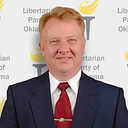That one time when Oklahoma enacted ranked choice voting

Jack Walton was impeached and removed from office as Governor of Oklahoma in 1923, but he was undeterred from continuing to seek office. The next year he ran for the open US Senate seat vacated by Robert Owen. In a field of five, including US Rep. E. B. Howard and former Senator Thomas P. Gore, Walton barely edged past Howard, winning with just 30% of the vote in the Democrat primary. In the general election that November Walton lost badly to the Republican, W. B. Pine. The Democrat-controlled Legislature that had just impeached Walton less than year before was quite displeased that he won the primary with a miniscule plurality and virtually assured the loss of the Senate seat to the Republicans.
The reaction of Democrats after George McGovern only managed to get a paltry 24% against Nixon in Oklahoma in 1972, when George Wallace was able to top 20% just four years earlier, was to make ballot access much harder for alternative parties. Democrats of 1925 were not dissimilar from Democrats of 1974 and immediately took steps to alter the election process in order to protect their own interests. However, the change they chose to make actually gave voters greater choice by mandating ranked voting.

There were some problems with the preferential primary system the Legislature enacted. First, it was only for primaries, not the general election. Second, rather than let second and third choice votes count the same as a first preference, second choice votes would only count as half a vote and a third choice would only credit the candidate with a third of a vote. But those second and third preferences would only be counted if no candidate had yet received a majority. However, the poison pill was that if a voter didn’t bother with making those second and third choices, or if the voter were to find all except one candidate to be too loathsome to merit a vote, then their first choice wouldn’t count. If their were three or four candidates, a voter had to mark a second preference, more than four and the voter was required to also mark a third.
Judges in Tulsa and in Carter County halted multi-candidate elections from taking place and the case was expedited to the state Supreme Court, which found the requirement to cast second and third choices unconstitutional and, rather than simply remove that requirement, tossed the whole law. By that time it was too late to do anything about the 1926 elections, which were held under the old rules allowing candidates to win by a plurality. Several of the Democrat primaries were won by candidates with a plurality of less than 20%. However, the Legislature was able to enact the run-off primary by 1930, the system we use today.
Under our current system, if no candidate in a primary election receives a majority of the vote, the two top vote-getters advance to the run-off. The additional election adds hundreds of thousands of dollars to the cost of the process in every general election. However, in special elections(and there’s a spate of them this year) there is no run-off, a plurality of votes names the winner. Nor is there a run-off in the general election.
Oklahoma should go back to it’s original idea of how to ensure that elections really are decided by a majority by enacting ranked choice voting, as Maine has recently done, but without requiring voters to make second and third choices if they don’t wish to do so. The half vote and third vote complications are entirely unnecessary as well. Costly low-turnout run-off elections could be entirely eliminated. Expanding ranked choice voting to general elections as well would ensure that every person elected to office in Oklahoma had the support of a majority, as well as eliminating the so-called wasted vote by allowing voters to support who they really prefer without having to worry about if their candidate can win.
With the easing of ballot access in Oklahoma, the Libertarian Party can be expected to be a fixture in the state’s elections. Independents regularly appear on the ballot and have had tremendous impact on occasion, such as races for governor featuring Gary Richardson in 2002 and Wes Watkins in 1994. The contradiction of run-offs for primaries but for general elections will become even more pronounced in the future. Some will no doubt claim there will be ballot confusion, as if people who can choose between dozens of fast food restaurants will be stymied by picking more than just one of two candidates, but presumably voters are at least as capable as those of the 1920s when no less than sixteen statewide offices were the ballot every four years(compared to half that many today). Its time for ranked choice voting for Oklahoma.








